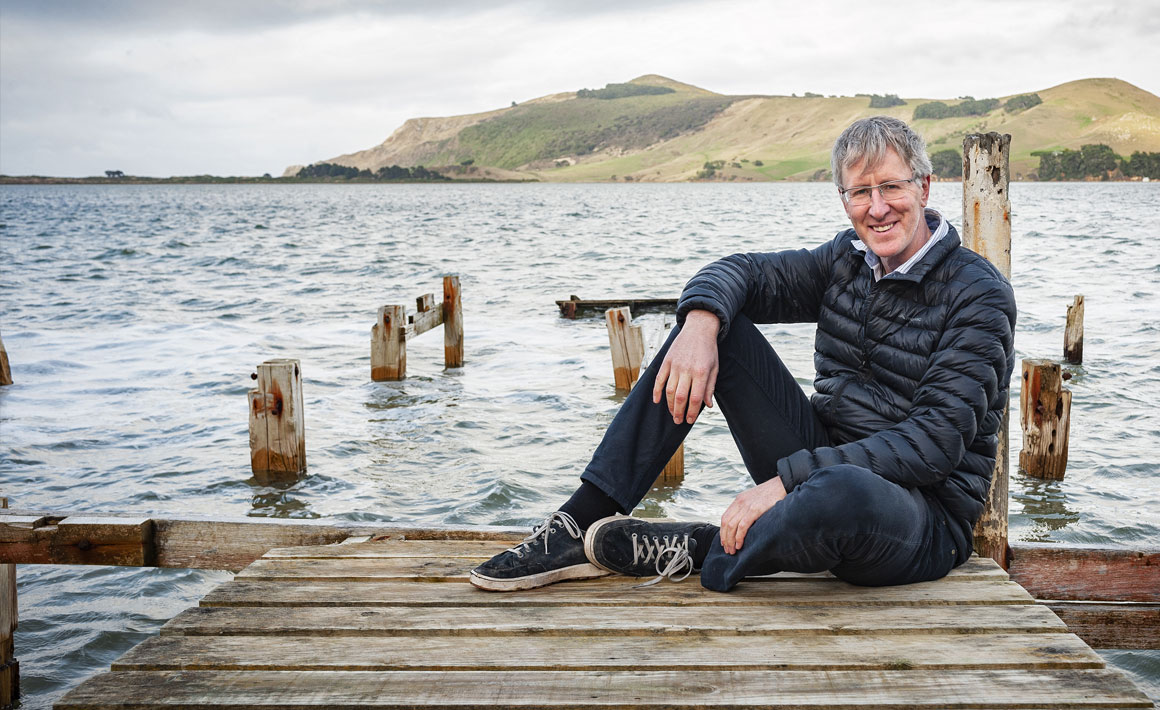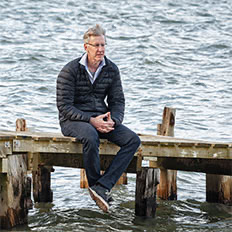
Tourism Professor James Higham argues that the COVID-ushered pause is the moment to reconceive the tourism industry.
Professor James Higham (Department of Tourism) was busy looking at the environmental impacts of tourism when COVID-19 came along and walloped the industry.
Higham was contracted by Mr Simon Upton, Parliamentary Commissioner for the Environment, to produce two research papers that informed the commissioner's recent crucial report titled “Pristine, popular…imperilled? The environmental consequences of projected tourism growth”. Upton's report was released on 18 December 2019; a few days later China reported the outbreak of the novel coronavirus to the World Health Organization. With air travel the key vector of transmission, tourism was felled.
$23B
Domestic tourism generates $23 billion of NZ's $40 billion annual tourism industry
With New Zealand's annual international tourist numbers nudging the four million mark in 2019, Upton's report noted that volume-based tourism had strained our environment and eroded the very attributes that make New Zealand such an attractive destination. It warned that we were in danger of killing the goose that laid the golden egg.
The overtourism backlash has been gathering momentum overseas. “In some European destinations there has been outright rebellion against tourism,” says Higham. “In places like Venice, Barcelona and Amsterdam, local residents have protested against the cruise industry and Airbnb. Graffiti at destinations has appeared saying 'tourists go home' and 'tourist: your luxury trip – my daily misery'.”
Then there's the growing phenomenon of 'flight shame' – a term coined in Sweden in 2018 around the same time as the hashtag #stayontheground. Higham points to an eight-page article titled “Travel without shame” published in June 2019 in a leading German newspaper, Die Zeit. It actively discouraged German tourists taking long-haul flights, singling out New Zealand for special mention. Depicting an image of Milford Sound alongside a Norwegian fjord, it urged Germans to choose the far lower environmental cost of travelling to Norway.
While wreaking havoc on humankind and paralysing New Zealand's tourism industry with unprecedented border closures and domestic lockdown, COVID-19 has inadvertently allowed time to stop and breathe. Given his interest in the impacts of tourist travel, Higham noted the aspects of lockdown that offered the exhausted planet some relief: less commuting, less consumption, less congestion, less noise, less pollution; more virtual work, more downtime, more family time, more daily exercise, more active transport, more birdsong. He thinks we should hold these experiences in our minds when considering how we shape our future: “COVID-19 has offered us a very rare opportunity to ask some important questions”.
$2.5B
1.5 million Australian tourists contribute a further $2.5 billion
Higham has spent a large part of his academic career signposting pathways towards sustainable tourism and has kept a watchful eye on the most carbon-voracious players in the industry – aviation, cruise and vehicle traffic. Climate change has been described as a pandemic in slow motion. Higham says tourism decarbonisation needs to happen in very fast motion. With planes grounded, borders shut and travel upended, this COVID-ushered pause is the moment to reconceive the tourism industry.
“We may be one of the first countries in the world to restore safe travel, but we might also lead the world in working towards tourism for a climate-safe future.”
Coronavirus has slashed carbon emissions to a level that we need to sustain year-in, year-out in order to meet our Paris climate objectives. Higham says precious time has been lost in decarbonising. “We need to ensure that the tourism that we rebuild will radically reduce the high carbon emissions associated with tourism GDP.”

Professor James Higham:
“We may be one of the first countries in the world to restore safe travel, but we might also lead the world in working towards tourism for a climate-safe future.”
Transportation lies at the heart of the transition to a low-carbon tourism economy. With the survival of many airlines now dependent on government rescue, some countries have added 'green conditions' to financial bailout packages. The French government has banned Air France from serving domestic routes that compete with high-speed rail. They've also instituted taxes to support investment in alternative low carbon transport modes.
“That's an interesting move,” Higham says. “Obviously they have infrastructures in place to allow for these modal shifts. We need to move quickly to invest in low carbon transport networks to support similar transport mode shifts in New Zealand.”
While Air New Zealand is looking into green alternatives to jet fuel, mass electric flight is still a distant prospect.
“The current technical regime is locked in and there is no silver bullet. We have been dependent on long-haul markets. We're going to have to get tourists to offset unavoidable emissions – as they are in the case of air travel. And revenue generated from offsetting must be invested in low carbon transitions.”
COVID-19 has opened our eyes to the long neglected domestic tourism market – our most sustainable market in terms of aviation emissions. Domestic and Australian tourists have a carbon footprint that is a fraction of long-haul visitor arrivals.
“Interestingly, domestic tourism generates $23 billion of the $40 billion-a-year tourism industry,” Higham says. “Furthermore, the 1.5 million Australians visiting New Zealand each year contribute a further $2.5 billion to tourism GDP. So the trans-Tasman bubble is in fact the backbone of the industry and, as long as New Zealanders are unable to travel overseas, the $5 billion that Kiwis usually spend on overseas trips each year will remain in the New Zealand economy.”
We have some world-leading tourism businesses. Higham says they need to be encouraged to continue innovating. That innovation needs to be directed at regenerative tourism.
“There are some great examples of this happening now: businesses that fund wildlife recovery programmes and engage visitors in conservation volunteering, predator control, plantings, beach clean-ups, and offsetting.” The opportunity to harness the power of regenerative tourism is enormous.”
Crises present opportunities to accelerate much needed change that may otherwise advance painfully slowly, or not at all. “Historians suggest that the 20th century actually began in 1914, when the First World War swept away the old Victorian ways that had continued into the new century. I'd like to think that in future we might reflect that 21st century sustainable tourism began in 2020 – change that may not have happened at all without the COVID-19 crisis.
“If we are to create a sustainable, resilient and climate-safe tourism future the opportunity for disruption is upon us.”
Funding
Office of the Parliamentary Commission for the Environment